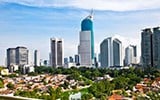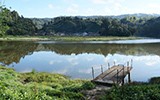Medical emergencies or accidents are always difficult to deal with when you are in a foreign country, especially if it is a ...
Living in Indonesia guide for expats
All the information you need to relocate and live in Indonesia.
Our selection of articles for expatriation in Indonesia
Surabaya may not be the ideal city for tourism in Indonesia, but it has many job opportunities. Here are some tips to ...
The multi-faceted island of Bali offers many opportunities for those who wish to move from tourist to expatriate status ...
Once you have settled in Jakarta, you will seek to make friends in order to adapt to your new environment. Luckily ...
It can sometimes be difficult, as an expat, to build a professional network in your new host country, especially in ...
The vibrant and fascinating capital of Indonesia is a place that leaves no one indifferent. Jakarta is a huge metropolis ...
Bali is idyllic, and its people are welcoming and charming. This is what comes out of various reviews and testimonials ...
Jakarta, home to more than 9 million people, is a bustling city full of opportunities. As Indonesia's financial and ...
If you are planning to relocate to Bali, housing is a critical part of your project. So how to find your "home" ...
Thanks to the country's large population, affordable labor force, and abundant natural resources, Indonesia offers ...
Bali is regarded as one of Indonesia's smallest islands with a large population but is home to the country's ...
When planning a move abroad, housing is a priority issue. If you expect to be away for a very long time, why not buy your ...
Being an international metropolitan city, Jakarta has a stunning and diversified gastronomic scene. From sweet and sour to ...
Jakarta is never boring. The Indonesian capital has countless fun activities and unique places to visit. Whether you are ...
In a new country, a new city, how do you start building a professional network? As an expat looking to work in Jakarta ...
About Indonesia
Covering an area of 1.905 million km², Indonesia is the largest country in Southeast Asia and the 14th largest in the world. Only about 8,000 of Indonesia's islands are inhabited. Each island has its own unique cultures, vibrant communities, and amazing destinations.
Indonesia has the second-highest level of biodiversity in the world. So, if you ever have the chance, don’t forget to explore the many wonders of Indonesia. Release your adventurous souls and hike various volcanoes across the country, dive to see the pristine coral reefs in Bunaken, spot orangutans in Borneo, or visit the famed Komodo Island.
The capital of Indonesia, Jakarta, is located in the nation’s most populous island of Java. Jakarta is the largest and most populous city in Indonesia. This bustling metropolitan serves as the central hub for business, economy, and entertainment in the country.
Demography of Indonesia
With more than 264 million people, Indonesia is the world’s fourth most populated country. It is home to more than over 700 languages and around 300 ethnic groups, making this wonderful country one of the most diverse nations in the world. The country is divided into 34 provinces, each with one-of-a-kind cultural traditions and lifestyles.
Despite having the world’s largest Muslim population, Indonesia officially recognizes six religions, including Islam, Hinduism, Buddhism, Protestantism, Catholicism, and Confucianism. Indonesia is also officially a secular democratic country and its people enjoy the freedom of religion.
The official language of the nation is Bahasa Indonesia. But many Indonesians are often multilingual, speaking one or more local dialects aside from Bahasa Indonesia. Additionally, English is rather widely spoken by young Indonesians, especially in larger cities. As a result, it wouldn’t be difficult for expatriates and tourists to communicate with the locals.
Economy of Indonesia
As of 2020, Indonesia is considered one of the world’s major emerging power. It is a member of the G20 and the 10th largest economy in the world in terms of purchasing power parity. Moreover, the country is also one of the fastest-growing economies in the world. In fact, it is expected to be the 5th most powerful economy in the world by 2030.
Despite its poor infrastructure and issues with corruption, investors are still attracted by its rich natural resources (namely gold, tin, copper, natural gas, and oil), agricultural production (namely palm oil, rice, coffee, tea, rubber, and spices), as well as its large consumer base. Besides, Indonesia’s booming economy has also opened new opportunities, both for local businesses and foreign investors. As a result, the country continues to attract foreign professionals. By the end of 2018, the Ministry of Labour in Indonesia reported that there are almost 100,000 expatriates residing in Indonesia.
Climate of Indonesia
Located across the equator, Indonesia has a tropical climate. So, you can expect the weather to be rather hot and humid all-year-round. The average temperature in the coastal plains is 28 °C and in the mountain areas temperature averages around 26 °C. The sun also shines quite strongly in the region, with the UV index reaching up to 10 on some days. So be sure to apply sunscreen before heading out to avoid sunburns.
There are two seasons in Indonesia, the wet season and the dry season. The wet season typically lasts from October to April and is characterized by heavy bursts of rain (and sometimes even typhoons). Meanwhile, the dry season spans from May to September.
Cost of living in Indonesia
The cost of living in Indonesia depends on which area you live in. Living in bigger cities, such as Jakarta, Medan, Denpasar, and Surabaya, calls for a higher living cost. However, you’ll be pleased to find out that Indonesia ranks 56th lowest cost of living in the world according to a survey conducted in 2017. This means, living in Indonesia is not too cheap or expensive.
The average person can live quite comfortably with just around IDR 10 million (around $750) per month. The number already includes the cost of food, basic utilities, internet, and rent for a humble apartment. Also, IDR 30 million (around $2,200) should be able to cover the living costs of a family of four, including rent for a small house.
Useful link:
Indonesia National Portal
Indonesia Tourism Website
Indonesian Immigration Portal
Latest housing offers in Indonesia
Latest job offers in Indonesia














